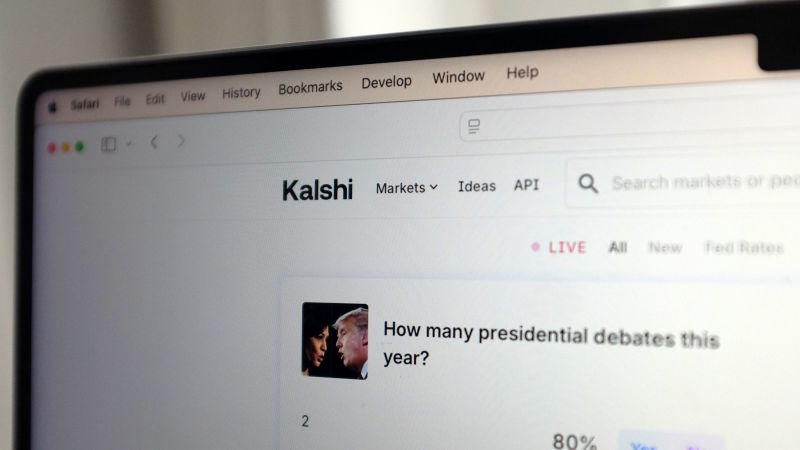A federal appeals court in Washington, DC, on Wednesday allowed a prediction market to offer election betting, denying a government watchdog’s request to halt a ruling that made way for legal political gambling in the United States.
Kalshi, an online platform where users can bet on the outcomes of future events, relaunched its congressional control contracts a few hours after the ruling, letting Americans bet on which party will control the House and Senate in 2025. It is unclear whether the New York-based startup will launch more election markets.
A panel of three judges unanimously ruled Wednesday that the Commodity Futures Trading Commission, which had argued that the wagers were illegal and could harm the integrity of elections, failed to demonstrate how it or the public “will be irreparably harmed while its appeal is heard.”
“In short, the concerns voiced by the Commission are understandable given the uncertain effects that Congressional Control Contracts will have on our elections, which are the very linchpin of our democracy,” Judge Patricia Millett wrote for the DC Circuit Court of Appeals. “But whether the statutory text allows the Commission to bar such event contracts is debatable, and the Commission has not substantiated that risks to election integrity are likely to materialize if Kalshi is allowed to operate its exchange during the pendency of this appeal.”
Wednesday’s ruling allows the agency to make another bid to pause the ruling while the appeal plays out “should more concrete evidence of irreparable harm develop.”
Kalshi initially rolled out the contracts on September 12 after US District Judge Jia Cobb in Washington rejected the commission’s bid to stop the platform from offering them. The CFTC quickly appealed the judge’s decision. The DC Circuit Court of Appeals then temporarily blocked Kalshi from offering the bets while it considered the agency’s proposal for a temporary pause.
Representatives for Kalshi and the CFTC did not immediately respond to requests for comment.
Tarek Mansour, a co-founder of Kalshi, celebrated the ruling on Wednesday.
“US presidential election markets are legal. Officially. Finally. Kalshi prevails,” he said on X.
Stephen Hall, legal director and securities specialist at Better Markets, a non-profit organization that advocates for financial reform, said the court’s order “makes this a sad and ominous day for election integrity in the United States.”
“The use of AI, ‘deepfakes’ and social media to manipulate voters and influence election outcomes has already become all too real. Ready access to an election gambling contract such as Kalshi’s will intensify that danger with the promise of quick profits,” he said in a statement.
Kalshi has long insisted the contracts are in the public interest because they provide accurate data for election forecasting and allow people to hedge their bets on different outcomes. The platform has also pointed towards the rise of Polymarket, an offshore, unregulated crypto-based prediction market that rose in popularity following the CNN debate in June. On that platform, users have bet more than $1 billion on the presidential race so far.
The ruling comes nearly two weeks after the panel heard arguments on whether to lift the pause on Kalshi’s congressional contracts. During the hourslong hearing, the judges pressed the agency on whether the markets would harm the integrity of the upcoming elections in November.
“I don’t want to be too dramatic, but we live in a country where tens of millions of Americans believe the last presidential election was stolen,” CFTC General Counsel Rob Schwartz said.
Schwartz argued that political betting markets were unlike “normal futures contracts” that have “objective” indicators that are reliable, like a published index or government report. Because the sources of information that election markets absorb can be “opaque and unreliable,” like polls with undisclosed methodologies or fake news reports, Schwartz suggested that they can be uniquely susceptible to manipulation.
Yaakov Roth, an attorney for Kalshi, touted the benefits of a platform like Kalshi, insisting that elections had significant economic consequences that “real people want to hedge.”
“The election itself causes certain companies to increase in value or decrease in value, that is the risk, and so to hedge that risk, you would want to buy an event contract that accommodates that and that accounts for that,” Roth said.
While the legal dispute with Kalshi plays out, the CFTC has also embarked on a broader clampdown on events-based betting. Earlier this year, the CFTC proposed a rule that would explicitly ban contracts on the outcomes of elections, awards shows and sports, among other things.
CFTC chairman Rostin Behnam, citing a “significant uptick in the number of event contracts listed for trading by CFTC-registered exchanges,” said in a May statement that those contracts would push the agency, a financial markets regulator, into “a position far beyond its congressional mandate and expertise.”
Read the full article here




